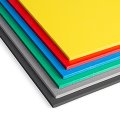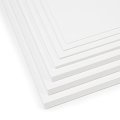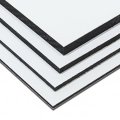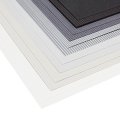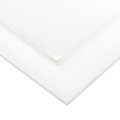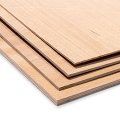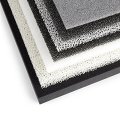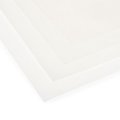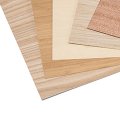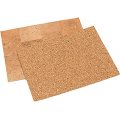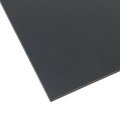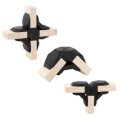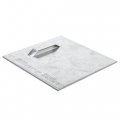Acrylic Sheets
Acrylic glass panels - The glass alternative for indoors and outdoors
Acrylic glass, or more precisely polymethyl methacrylate (PMMA), is a synthetic polymer and is one of the so-called thermoplastics. While the service temperature of acrylic glass is between -40 °C and 70 °C, it can be deformed by adding heat and at temperatures between 150 °C and 160 °C. The temperature of acrylic glass is between -40 °C and 70 °C. The temperature of acrylic glass is between 150 °C and 160 °C. Acrylic glass begins to melt at 160 °C and above. Since acrylic glass belongs to building material class B2, it is considered to be normally flammable with a few exceptions.
In contrast to glass, acrylic glass sheets have a weight reduced by almost half. Combined with higher light transmission, weather resistance, flexibility resulting from high impact strength and comparatively simple thermal and mechanical processing, plastic glass is a popular alternative to conventional glass. Whether transparent, opaque or satin-finished, whether colourless or coloured, as a plate, rod or block: there are virtually no limits to the applications of acrylic glass in the decorative and practical-functional field.
In trade fair, display and shop construction, acrylic glass and PLEXIGLAS® panels ensure a safe and yet crystal-clear presentation of exhibits and sales items. In addition to table stands and counter superstructures and panelling, the desired atmosphere can be created with light and coloured acrylic glass panels. In furniture construction, acrylic glass panels are used for lightweight constructions such as illuminated screens, storage systems, storage compartments, picture frames, aquariums and much more. The transparent and functional properties of the plastic glass panels complement each other wonderfully as table covers and splash guards in kitchens and workshops.
Since acrylic glass panels can also be used outdoors without hesitation, this provides opportunities for cladding and wind protection of balconies, conservatories, fences and (stair) railings. Using opaque or satin PLEXIGLAS®, the glazing is both decorative and privacy protection. Acrylic glass panels are also very popular for signage in agencies, practices and offices or as stable, durable advertising signs.
Acrylic glass GS - Cast plastic glass in high quality
Acrylic glass GS refers to the cast and therefore high-quality variant of acrylic glass. It is easier to machine and thermoform. For the production of acrylic glass GS sheets and acrylic glass GS blocks, liquid PMMA polymerises between two glass sheets. The result is a material with outstanding properties: The material is break-resistant, weather-resistant, highly transparent and can be easily further processed. Acrylic glass GS can be milled, drilled, sawn and formed at temperatures between 160 °C and 180 °C. The material is also resistant to weathering and can be easily further processed. When milling on the CNC milling machine, please observe the thickness tolerances of the material. The values of the possible tolerances can be determined using the following formula: Tolerance = ± (0.4 + 0.1 x thickness) mm. We recommend cast precision acrylic glass for fine milling work, which is often carried out in model making.
Precision acrylic glass - finest acrylic glass plates for displays and model making
Precision acrylic glass is a cast acrylic glass sheet which differs from commercially available acrylic glass mainly because of its extremely low thickness tolerances (± 0.1 mm for sheets up to s=1.0 mm, ± 0.2 mm for sheets from s=1.5 mm). In contrast to other cast acrylic glasses such as PLEXIGLAS® GS, precision acrylic glasses are available from a thickness of 0.5 mm upwards. In order to be able to guarantee the desired high quality standards, all sheets are manually checked by the manufacturers for thickness tolerances and optical defects.
Precision acrylic glass is characterised by the fact that it can be produced to order in very small production quantities (12.5 m² or 7.5 m²/type) in an extensive colour range and various surface structures as well as in panel thicknesses between 0.5 mm and 6.3 mm (or 4.0 mm). For comparison: Normally, order-related production of acrylic glass requires purchase quantities of at least 300 kg/type.
Precision acrylic glass is a highly valued material for covering displays in consumer electronics and medicine. In addition, its low thickness tolerances make it perfect for precise milling and drilling work in model making. Both the production of individual model parts such as lightly coloured and flat glass facades and the production of entire architectural models are easily possible with precision acrylic glass.
Acrylic glass XT - The low-cost alternative
Acrylic glass XT is an extruded acrylic glass, for which granulate is melted and drawn into shape by means of an extruder. It is slightly cheaper than GS acrylic glass. We offer acrylic glass XT not only as thin sheets, but also as rods, tubes, balls and cubes. In contrast to cast acrylic glass, XT acrylic glass in sheet form is slightly more dimensionally stable and has lower thickness tolerances. It melts faster during processing, smears drills and saws and retains a whiter cutting edge. Unlike acrylic glass GS, it is more difficult to machine. For this reason, extruded material is perfect for work that requires little drilling, milling and turning.
In terms of surface quality, visible transparency and resistance to weathering and ageing, acrylic glass XT and GS hardly differ. We recommend the choice of the cheaper acrylic glass XT for glazing, picture framing, simple model making and wherever untreated surfaces are used.
The processing of acrylic glasses
Table circular saws, jigsaws and milling machines with fine-toothed saw blades as well as lasers are suitable for cutting and processing acrylic glass panels. In order to obtain the most transparent cutting edges possible, it is advisable to add a little detergent, especially in model making. High-gloss edges can be achieved by grinding and polishing. Acrylic glass sheets up to a thickness of 3 mm can also be cut with the acrylic cutter. A clever alternative in this context is multiple scribing and breaking of the glass at one edge of the table.
For the cleaning of acrylic glass we recommend warm water with detergent or special plastic cleaner. Acrylic glass should not be cleaned with glass cleaning agents as these can attack the plastic.
In order to glue acrylic glass sheets together, we recommend special plastic adhesives such as Acrifix, Ruderer or Dichlormethan.
Acrylic glass panels cut to size
Our wide assortment of acrylic glass is characterised by a variety of colours, a wide range of different panel thicknesses between 0.3 mm and 50 mm and panel sizes up to 1.5 x 2.0 m. For all cases in which the desired size is not available among the various panel formats, acrylic glass cubes and blocks, we offer an individual cut.
Many of our acrylic glasses and PLEXIGLAS®can be cut to size according to your wishes and ideas. For information on the minimum cutting dimensions, prices and immediate cutting in the Modulor shop, please see the product page of the respective plastic glass and our page on individual material processing. Discover our complete range of acrylic glass cuttings.
